Attention Canadians and residents of Hong Kong:
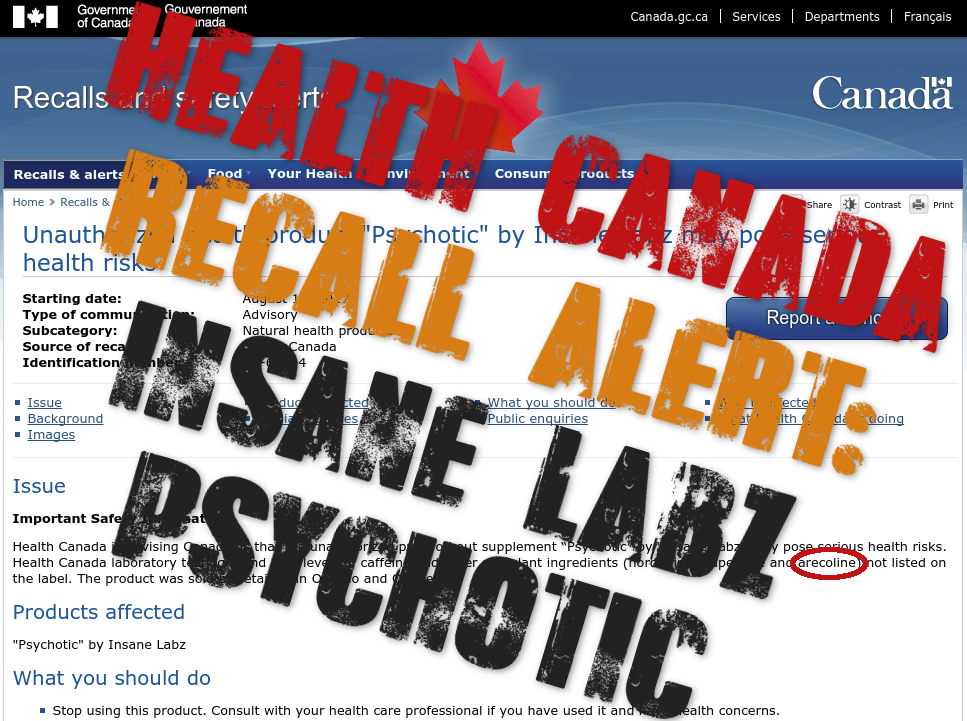
Health Canada issued a recall alert after finding mislabeled arecoline in the 'international' version of the Insane Labz Psychotic pre workout supplement
On August 10, 2017, Health Canada issued a "Recall and safety alert" titled Unauthorized health product "Psychotic" by Insane Labz may pose serious health risks,[1] urging consumers to stop using the supplement while also requesting that the brand initiate a product recall for it.
The government of Hong Kong followed suit, linking to Health Canada's alert in an article with a heading "Products found to contain undeclared medicines".[2]
After that, Health Canada posted their recall through Nutri-Genics Distributors Inc,[3] citing "Product sold without market authorization (NPN) in Canada. Product contains undeclared levels of caffeine that in combination with other stimulants may pose a risk to health."
Although the top two advisories contain some inaccuracies, we do agree that there is reason for concern from a consumer safety standpoint, due to the potential carcinogenic nature of one of the ingredients Health Canada found inside.
Why is Health Canada requesting Insane Labz Psychotic be recalled?
The first advisory states the following:
Health Canada is advising Canadians that the unauthorized pre-workout supplement “Psychotic” by “Insane Labz” may pose serious health risks. Health Canada laboratory testing found high levels of caffeine and other stimulant ingredients (hordenine, huperzine and arecoline) not listed on the label.[1]
They then embedded the following two images:
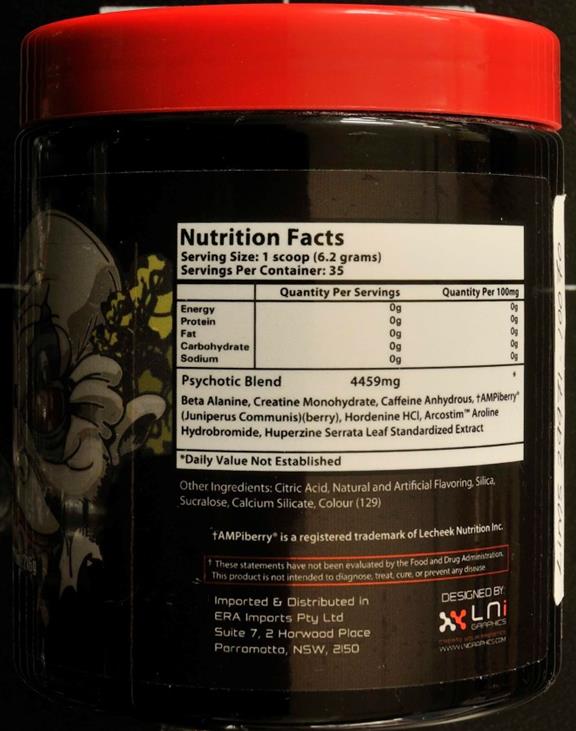
The label from Health Canada (archive)
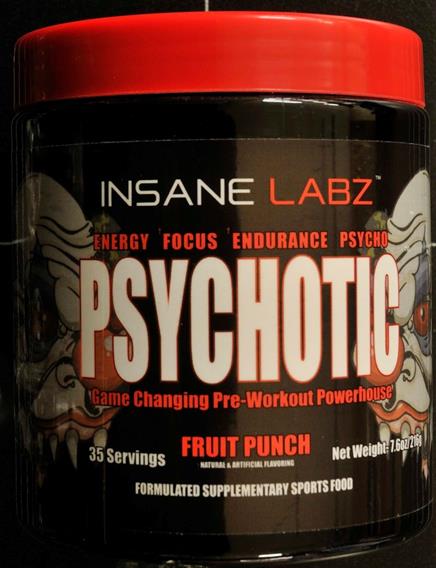
The product image from Health Canada (archive)
If you look at the first image, the part quoted above in red is where Health Canada obviously made a mistake -- the label clearly shows both hordenine and huperzine on it - yet they're claiming they found it inside while insisting it's not listed on the label.
That part is incorrect, and we're unsure how Health Canada overlooked it... but it's likely the third ingredient in question that's the real concern:
What's "Arcostim aroline hydrobromide"???
The label on Health Canada's website shown above cites an ingredient named "Arcostim aroline hydrobromide".
"Arecoline is a carcinogen that is cytotoxic, hepatotoxic, and damages sperm and testes.[10-19]"
However, when searching Chemspider,[4] there doesn't seem to be any such chemical compound with the name of "aroline hydrobromide", nor any kind of "aroline" for that matter.
There does exist, however, arecoline hydrobromide, which aligns with the arecoline that Health Canada claims to have found.[1] So we're led to assume that the tub Health Canada purchased had a misspelling of the actual ingredient, arecoline hydrobromide.
Insane Labz responds - This version not sold in the US:
Upon reading the two health advisories, we immediately reached out to the brand via their website's contact form and on Facebook for comment, asking about the inclusion of arecoline and to please verify the label. We were met with this response:
”The label is on our website from Psychotic that doesn’t have the ingredient you are referring to and has never in the USA. Do not publish inaccurate info as we have already passed this on to our lawyer. All further discussion will not be on Facebook but through our lawyer.
-- Insane Labz
We cannot confirm whether it's true that no arecoline-based Psychotic has ever been sold in the US, but digging through the known archives for their Psychotic product page, the oldest one being from August 31, 2017, we can confirm that it does not contain the "aroline hydrobromide" ingredient that Health Canada found. However, note that Health Canada's warning was on August 10, 2017 -- three weeks prior to that first-known archive.
Regardless, Insane Labz' response seems to be right - Health Canada's offending tub was likely an "international" version of the Psychotic pre workout supplement sold outside of the United States. Semi-confirming this at the time of writing, the "aroline"-based Psychotic is listed on at least two German e-commerce websites.[5-8]
Unfortunately, carcinogens are likely just as dangerous outside of the US as they are inside, which brings us to arecoline itself:
The dangers of arecoline
While the misspelling could be considered a suspicious "adulteration" by some government agencies, mistakes do happen and misspellings can often be forgiven.
The bigger issue, however, is that arecoline is a carcinogen that is cytotoxic, hepatotoxic, and damages sperm and testes.[10-19] Because of those research studies, we've always recommended that all health-conscious consumers -- regardless of nationality / ethnicity or legality -- stay far away from it.
Although Health Canada's advisories never got into the details about the ingredient -- and may not even be recalling it because of it - it's still worth exploring. Our original arecoline post was published on September 15, 2015, where we warned of ingredients mentioning "betel nut", "ArcoFuel", "areca nut", "betel quid", and another odd misspelling we've seen, "AcoFeul".
The long story short is that arecoline is molecularly similar to nicotine, and elicits a similar effect (both in energy/focus on the "benefit" side and in toxicity on the very negative side).
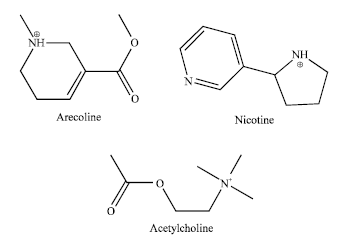
Arecoline and Nicotine are structured similarly enough that they both bind to certain acetylcholine receptors, eliciting quite similar effects (both positive and negative). Image courtesy Research Journal of Medicinal Plant.
The compound was originally discovered in the betel nut, which is often chewed in certain Southeast Asian nations. You can consider the arecoline from betel nut to be akin to the nicotine from tobacco. Just like smoking tobacco cigarettes causes an insane number of diseases, so does betel nut chewing.[9]
There's absolutely no argument that betel nut is horrifically toxic. The bigger question is, how much is arecoline to blame? The research shows that it is definitely at least part of the problem:
Arecoline Research: You sure this is a good idea to take?
There are droves of studies citing its potential side effects and toxicity of arecoline. Here’s a mere partial rundown of the research documenting its deleterious actions - and it doesn't take monstrous doses for them to happen as we'll later show:
-
Arecoline is cytotoxic for human endothelial cells[10]
-
Synergistic effects of nicotine on arecoline-induced cytotoxicity in human buccal mucosal fibroblasts[11]
-
Arecoline cytotoxicity on human oral mucosal fibroblasts related to cellular thiol and esterase activities[12]
-
In vitro effects of arecoline on sperm motility and cyclooxygenase-2 expression[13]
https://pubmed.ncbi.nlm.nih.gov/16538046 / https://www.jstage.jst.go.jp/article/jts/31/1/31_1_75/_pdf/-char/en
-
Induction of shape abnormality and unscheduled DNA synthesis by arecoline in the germ cells of mice[14]
-
Arecoline tumorigenicity in Swiss strain mice on normal and vitamin B deficient diet[15]
-
The hepatotoxicity and testicular toxicity induced by arecoline in mice and protective effects of vitamins C and E[16]
-
Characterization of arecoline-induced effects on cytotoxicity in normal human gingival fibroblasts by global gene expression profiling[17]
https://pubmed.ncbi.nlm.nih.gov/17682004 / https://academic.oup.com/toxsci/article/100/1/66/1624999
-
The induction of prostaglandin E2 production, interleukin-6 production, cell cycle arrest, and cytotoxicity in primary oral keratinocytes and KB cancer cells by areca nut ingredients is differentially regulated by MEK/ERK activation.[18]
https://pubmed.ncbi.nlm.nih.gov/15375172 / https://www.jbc.org/content/279/49/50676.long
-
Immunosuppression, hepatotoxicity and depression of antioxidant status by arecoline in albino mice[19]
-
Arecoline-induced changes of poly-ADP-ribosylation of cellular proteins and its influence on chromatin organization.[20]
-
Arecoline-induced growth arrest and p21WAF1 expression are dependent on p53 in rat hepatocytes[21]
-
Effects of arecoline in relaxing human umbilical vessels and inhibiting endothelial cell growth[22]
-
A metabolomic approach to the metabolism of the areca nut alkaloids arecoline and arecaidine in the mouse[23]
-
Effects of arecoline on hepatic cytochrome P450 activity and oxidative stress[24]
There are even more studies - many of which covered in the IARC (International Agency for Research on Cancer)'s "Betel-Quid and Areca-Nut Chewing",[9] a 240-page monograph that explains the dangers of betel nut chewing and its constituents -- arecoline is mentioned 242 times in the text and there are far more sources cited.
But at what dosage?
Despite the research cited above, there are some who somehow still argue for arecoline's safety. They often make [unproven] claims that the doses found in supplements are not large enough to cause problems, which is difficult to even qualify because most of those supplements contain proprietary blends!
However, if you were to open up the aforementioned IARC Research PDF[9] and do a search (using Ctrl-F) for 1 mg (with a space), you'll see the following mouse study at just 1mg:
Groups of 8–20 female and 16–35 male Swiss mice, 6 weeks of age, were given 1 mg arecoline hydrochloride (in 0.1 mL distilled water) daily by gavage on 5 days a week, either alone or in combination with potassium nitrate (KNO3) (1 mg daily), or KNO3 with slaked lime (1 mg daily); controls were either untreated or received KNO3 and lime.
Treatment was continued for up to 25 months. A total of 15/35 (43%) males given arecoline alone developed tumours (8/18 between 12 and 18 months and 7/17 between 19 and 25 months) compared with 1/20 untreated males. Of the 15 tumours in the arecoline group, eight were liver haemangiomas, four were lung adenocarcinomas and three were squamous-cell carcinomas of the stomach.[2]
(emphasis ours)
That's a 43% cancer rate from just 1mg dose in male mice. The researchers couldn't tell why male mice were so much worse off than the females, but that's certainly not reassuring, given that males are the primary market demographic for pre workout supplements, especially these "hardcore" ones.
We need human equivalent doses
Of course, we're not mice, so let's do a conversion to human equivalent dose, or HED.
The equation states that
....where:
- Human Km = 37,
- Mouse Km = 3, and as an FYI,
- Rat Km = 6.
The first issue is that the researchers did not state the weight of their mice anywhere, and we cannot find any supplemental data. So in order to estimate, looking at the Swiss mice for sale,[25] we can see that the average male weighs 39.7g after 10 weeks.
Plugging that into the equation:
HED (mg/kg) = 2.04mg/kg
So for an average 165lb male, which is nearly 75kg, Swiss rats receiving 1mg arecoline and getting 43% cancer after 25 months is about the same as a 165lb male taking 153mg arecoline daily according to this study - but again, that's an estimate due to their lack of disclosure for the mice's weights.
The pitfalls of proprietary blends
The second issue is that it's impossible to compare the above dose to the international version of Insane Labz Psychotic because of its proprietary blend!
Health Canada did not disclose how much of any of the stimulants they found, only that "Product contains undeclared levels of caffeine that in combination with other stimulants may pose a risk to health."[1]
In this formula, the "aroline" is between hordenine and huperzine A. Given that hordenine seems to universally dosed at 50mg and Huperzine A never goes above 200mcg, the best we can guess is that the arecoline dose is somewhere between 50mg and 200mcg.
This is nearly no help, which is one of the major pitfalls of proprietary blends, but it's at least promising that consumers likely never got the "human-equivalent 153mg" where 43% of male mice got cancer after 25 months!
The part that's not promising?
A linear response in other studies raises concern at nearly any dosage
Unfortunately, if there is a linear dose response for humans -- which is exactly what was discovered in the study investigating arecoline's abnormal sperm effect[9,14] -- then even a fraction of ~153mg is still cause for serious concern... or, at the very least, something consumers need to know about.
Suffice to say that arecoline is a very dangerous compound and we don't believe it should be anywhere near your body, regardless of dosage, at least not if you want to live a long and healthy life free of unnecessary carcinogens.
Arecoline makes a comeback internationally? Not if Canada can help it...
The ingredient seemed to have mostly disappeared from the sports supplement landscape in 2016 - especially in the US after our original arecoline article was published. However, this international version of Insane Labz's Psychotic slipped under the radar - that is, until Health Canada found it and claimed it was not on the label.
Instead, we argue that it was on the label -- just curiously misspelled.
At the time of press, we only know of the governments of Hong Kong and Canada having issued warnings over this product.[1-3] And rather than issue their own warning letter, Hong Kong simply linked to the Canadian one as an alert to their own citizens.[2] Beyond that, their government doesn't seem to be taking any specific actions at this time.
However, Health Canada called for the Canadian distributor of Psychotic, Nutri-Genics, to issue a recall on the product, citing "Product sold without market authorization (NPN) in Canada. Product contains undeclared levels of caffeine that in combination with other stimulants may pose a risk to health."[3]
OPINION: Do what you want, but arecoline is not worth the risk
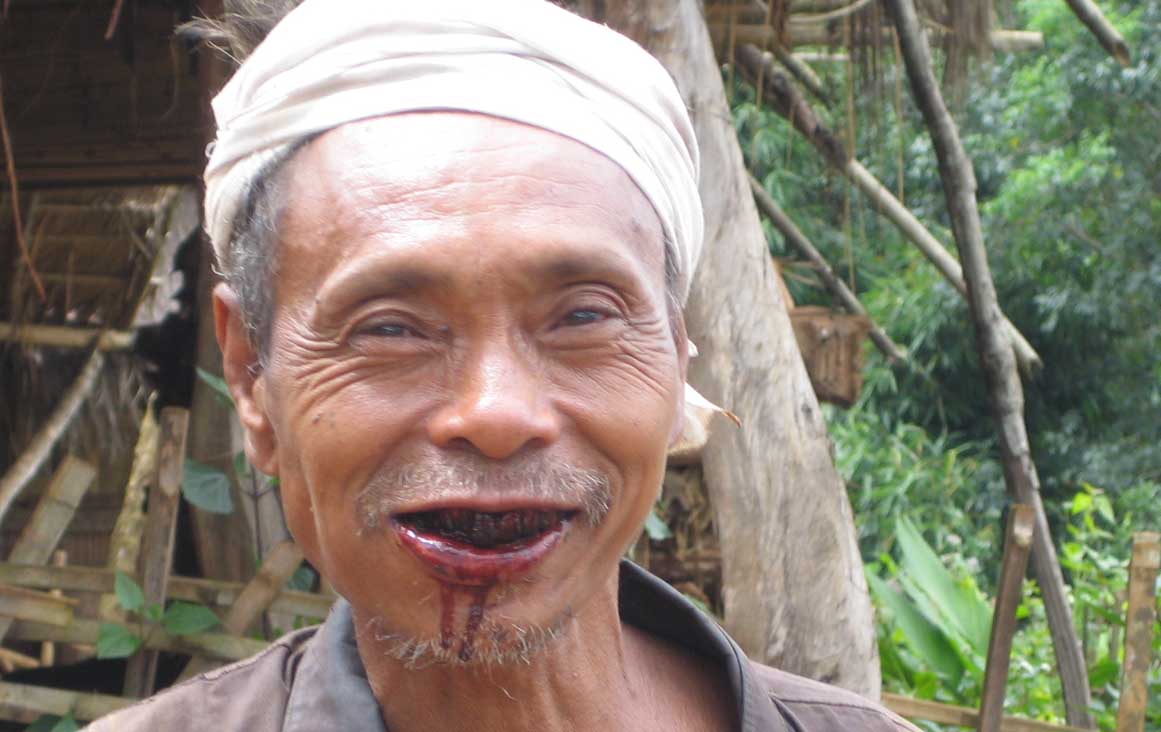
The detriment of betel nut is beyond well-documented. This image shows the stained teeth of a regular betel chewer in Burma. Arecoline is a major carcinogen inside betel nut. Courtesy Wikimedia Commons.
Despite its "basis in nature" and the reports that the ingredient elicits minor positive effects in energy and focus, we simply do not believe those effects are worth the relative risk that is presented by this compound.
All stimulants -- even caffeine -- carry with them a certain risk profile, and given the overwhelming amounts of toxicity research, we do not believe this one is net-positive - especially when it's buried in a massive proprietary blend.
Were this a situation occurring in the United States, it would be the FDA's burden to prove that the ingredient is dangerous, thus rendering it "adulterated". We don't believe it'd be a difficult case for them to make, and in fact, an arecoline-based study is cited in their "Poisonous Plant Database",[26] which is another bad sign.
But for the time being, unless further steps are taken in the United States, the ingredient remains in a certain gray area, and other nations may be in similar situations.
So, our take is that high-risk consumers are free to do as they wish so long as they have the research available to them -- but the research simply doesn't look good for this one.
It would also help all ingredients -- especially the higher-risk ones -- on said labels were actually spelled correctly too.
Caveat emptor: Canadians have been warned, but Germans should also beware
Following the release of the warning letters, Nutri-Genics confirmed they have stopped selling and distributing the product. We are unsure how far along the recall is, or how many tubs are for sale in Canadian brick & mortar shops, but at the time of press, the only tubs we're finding for sale online are in Germany.
As always, we urge consumers to research each and every ingredient in all products they take, since dangerous compounds can always fly under the radar. We further urge supplement companies to avoid using carcinogens in their products, a request that should go without saying.
When it comes to arecoline, we just don't think the pros are worth the laundry list of cons. Hopefully Insane Labz gets the few remaining tubs off the market - especially in Canada and Hong Kong, but also those remaining stores in Germany as well.
Arecoline is bad news. Buyer beware.
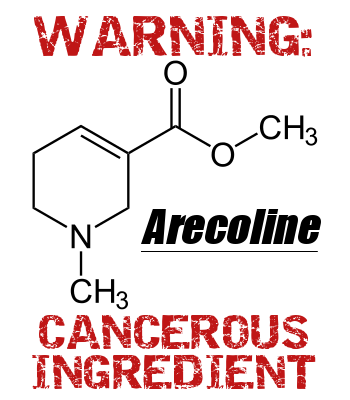
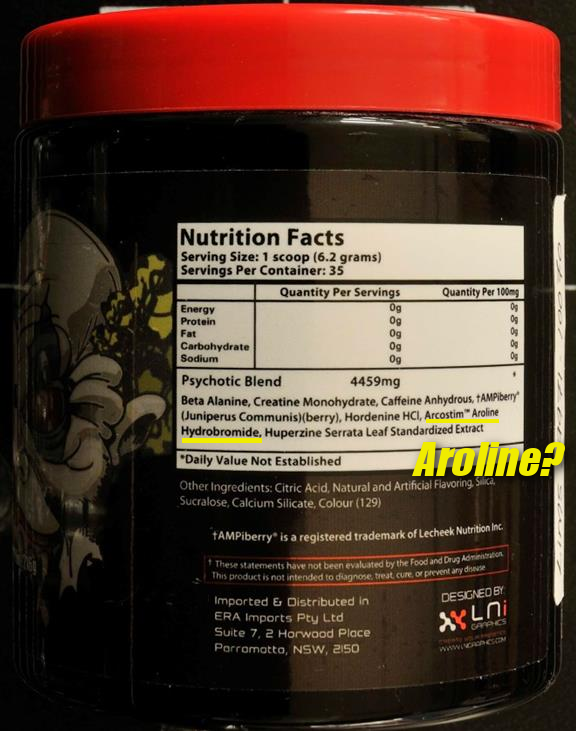


Comments and Discussion (Powered by the PricePlow Forum)